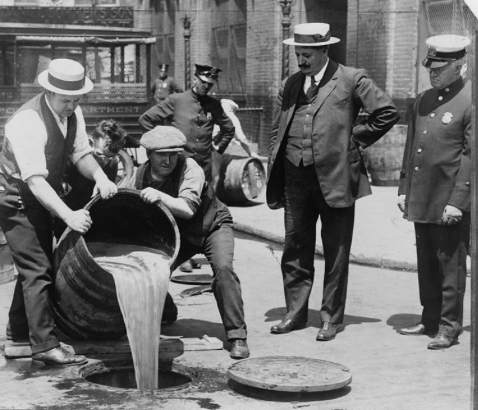1920 The Prohibition Era begins in the United States
The American struggle against the evils of the alcohol trade was a long and hard one, waged at first largely by women who were seen as the chief victims of drunkenness. The Women’s Christian Temperance Union (WCTU) and the Anti-Saloon League did much in the 19th and early 20th centuries to bring the issue before the public. Kansas became the first dry state with an amendment to its constitution in 1881 but the movement aroused deep opposition along ethnic, political and religious lines. Protestants tended to be for prohibition and Catholics (and Episcopalians) against; the labour movement, smaller cities and Progressive reformers were for it, and the bigger cities and establishment politicians were against.
The Eighteenth Amendment to the American Constitution was passed by Congress in late 1917 and had to be ratified by 3/4 of the states for it to come into effect. This ratification occurred in January 1919 and took effect a year later. The federal Volstead Act was passed to outline methods of enforcing the ban on the manufacture, importation and sale of alcohol (though consumption remained legal).
The benefits of Prohibition were as predicted — dramatic decreases in alcoholism, industrial accidents, cirrhosis of the liver, drunken family abuse — but it also produced a nation of scoff-laws who resisted the alcohol ban. There were also negative impacts on the agricultural economy, a drop in tax revenue, and a benefit to criminal gangs who continued the illicit trade in booze. Franklin Roosevelt was elected in 1932 on a platform of abolishing Prohibition and this was accomplished in December, 1933 with the Twenty-First Amendment.

Yet another reason to think highly of FDR.
Cheers…..